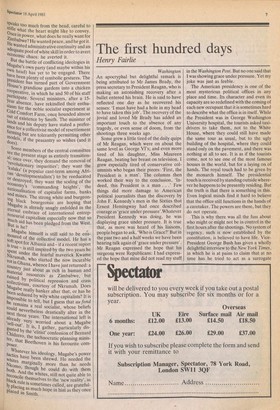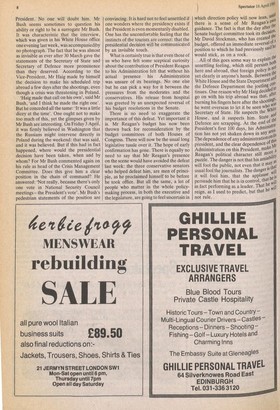The first hundred days
Henry Fairlie
Washington An apocryphal but delightful remark is being attributed to Mr James Brady, the press secretary to President Reagan, who is making an astonishing recovery after a bullet entered his brain. He is said to have reflected one day as he recovered his senses: 'I must have had a hole in my head to have taken this job'. The recovery of the jovial and loved Mr Brady has added an important touch to the absence of any tragedy, or even sense of doom, from the shootings three weeks ago. Some grew a little tired of the daily quips of Mr Reagan, which were on about the same level as George VI's; and even more tired of his daughter, Miss Maureen Reagan, beating her breast on television. I grew especially tired of conservative columnists who began their pieces: 'First, the President is a man'. The columns then worked their way to the conclusion, 'Indeed, this President is a man . . .' Few things did more damage to American political journalists than the discovery by John F. Kennedy's men in the Sixties that Ernest Hemingway had once described courage as 'grace under pressure' .Whatever President Kennedy was doing, •he was displaying grace under pressure. It is true that, as more was heard of his liaisons, people began to ask, Who is Grace?' But in the past two and a half weeks we have been hearing talk again of 'grace under pressure'. Mr Reagan expressed the hope that his surgeons were Republicans: I had expressed the hope that mine did not read my stuff in the Washington Post. But no one said that I was showing grace under pressure. Yet my joke was just as feeble, The American presidency is one of the most mysterious political offices in any place and time. Its character and even its capacity are so redefined with the coming of each new occupant that it is sometimes hard to describe what the office is in itself. While the President was in George Washington University hospital, the tourists asked taxidrivers to take them, not to the White House, where they could still have made the same tour as usual, but to the ugly building of the hospital, where they could stand only on the pavement, and there was nothing at all to see. It is as if the tourists come, not to see one of the most famous houses in the world, but for a laying on of hands. The royal touch had to be given by the monarch himself. The presidential touch is received by standing outside wherever he happens to be presently residing. But the truth is that there is something in this. Even logical minds find it hard to believe that the office still functions in the hands of a caretaker. The powers are there, but they do not operate.
This is why there was all the fuss about who might or might not be in control in the first hours after the shootings. No system of regency, such is now established by the constitution, is believed to have life. VicePresident George Bush has given a wholly delightful interview to the New York Times, in which he is at pains to claim that at no time has he tried to act as a surrogate President. No one will doubt him. Mr Bush seems sometimes to question his ability or right to be a surrogate Mr Bush. It was characteristic that the interview, which was given in his White House office one evening last week, was accompaniediby no photograph. The fact that he was almost as invisible as ever after 30 March gave the statements of the Secretary of State and Secretary of Defence more prominence than they deserved. According to the Vice-President, Mr Haig made by himself the decision to make his scheduled trip abroad a few days after the shootings, even though a crisis was threatening in Poland.
'Haig made that call on his own', said Mr Bush, 'and I think he made the right one'. But he conceded all the same: 'It was a little dicey at the time'. One ought not to make too much of this, yet the glimpses given by Mr Bush are interesting. On Friday 3 April, it was firmly believed in Washington that the Russians might intervene directly in Poland during the weekend: that was said, and it was believed. But if this had in fact happened, where would the presidential decision have been taken, when and by whom? For Mr Bush commented again on his rule as head of the Crisis Management Committee. Does this give him a clear position in the chain of command? He answered: 'Not really, because there's only one vote in National Security Council meetings — the President's vote'. Mr Bush's pedestrian statements of the position are convincing. It is hard not to feel unsettled if one wonders where the presidency exists if the President is even momentarily disabled. One has the uncomfortable, feeling that the instincts of the tourists are correct: that the presidential decision will be communicated by an invisible touch.
What is certainly true is that even those of us who have felt some sceptical curiosity about the contribution of President Reagan to his Administration felt that without his actual presence his Administration was unsure of its bearings. No one else but he can pick a way for it between the pressures from the moderates and the conservatives. His release from hospital was greeted by an unexpected reversal of his budget resolutions in the Senate.
There is no need to exaggerate the importance of this defeat. Yet important it is. Mr Reagan's budget has now been thrown back for reconsideration by the budget committees of both Houses of Congress. There will now be the usual long legislative tussle over it. The hope of early confirmation has gone. There is equally no need to say that Mr Reagan's presence on the scene would have avoided the defeat last week: the three conservative senators who helped defeat him, are men of principle, as he proclaimed himself to be before he took office. But all the same, a lot of people who matter in the whole policymaking process, in both the executive and the legislature, are going to feel uncertain in which direction policy will now lean, lit' there is a sense of Mr Reagan's 0" guidance. The fact is that the day after the Senate budget committee took its decision' Mr David Stockman, who has created the budget, offered an immediate reversal 0f a position to which he had previously said Ile would stick, as on a rock. All of this goes some way to explain tb,eh unsettling feeling, which still persists bolt here and abroad, that foreign policy is it yet clearly in anyone's hands. Between WA"' White House and the State Department an" the Defence Department the jostling o°11. tinues. One reason why Mr Haig decided le go on with his trip abroad was that, after burning his fingers here after the shooting' he went overseas to let it be seen who w,8se Secretary of State. He suspects the Willtd House, and it suspects him. State and Defence are scrapping. At the end of we President's first 100 days, his Administll. lion has not yet shaken down in any all's The dependence of any administration president, and the clear dependence of ti; Administration on this President, make Reagan's political character still Ivor,, a% puzzle. The danger is not that his ainiabil11.'s will fool the public, not even that it maY at usual fool the journalists. The danger is VI it will fool him, that the applause ,s persuade him that he is in control, that tit in fact performing as a leader. That he reign, as I used to predict, but that he gi not rule.







































 Previous page
Previous page